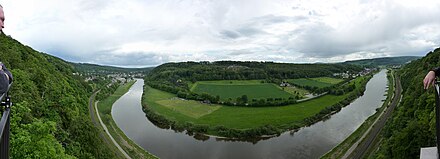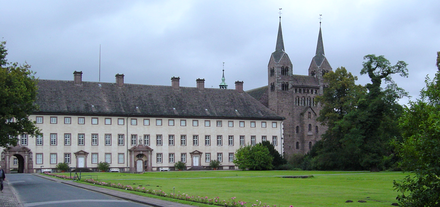Southern Lower Saxony
Southern Lower Saxony contains the hilly and mountainous parts of this state, namely the Upper Harz mountains, Weser and Leine Uplands with their respective foothills and valleys as well as the Western portion of the Eichsfeld region.
Cities
- Göttingen , biggest city and transportation hub of the region, mainly known for its university and research institutions

Harz
- Bad Harzburg — charming spa town, ancient cable cars, and a base for walks in the surrounding hills
- Braunlage — the main ski resort and cable car to Lower Saxony's highest peak, the Wurmberg
- Clausthal-Zellerfeld — a resort in the Harz. Its manufactures include textiles and wood products. The town was once a centre for the mining of copper, zinc, and lead
- Goslar — former Free Imperial Town with a more than 1000-year old history
- Sankt Andreasberg — former mining town
- Torfhaus — the highest settlement in Lower Saxony and base for numerous walks
- Herzberg am Harz
Weser and Leine Uplands
- Bad Gandersheim
- Einbeck
- Hamelin – famous for the Pied Piper of Hamelin legend
- Hann. Münden – "Town of three rivers" where Werra and Fulda issue into the Weser, picturesque with half-timbered houses and Renaissance buildings
- Wiedensahl
Other destinations

Understand
Get in
By plane
The closest airport is Hanover (IATA: HAJ), 65–160 km north of this region. From their you may connect by rail to Hamelin or Göttingen in a little more than an hour. Germany's biggest air hub Frankfurt Airport (IATA: FRA) is some 250–300 km away. ICE high-speed trains take you directly from the airport station to Göttingen in less than two hours.
By train
The region's only ICE stop is Göttingen which is served twice an hour from Hanover (35 minutes), Frankfurt (1:45 hours), Hamburg (2 hours) and hourly from Munich (3½ hours). From Göttingen you may transfer to regional trains to most other parts of the region. The northern parts of the Weser Uplands are however more easily reached via Hanover, from where local trains connect to e.g. Hamelin and Bad Pyrmont. If your destination is on the northern slope of the Harz, it may be preferable to change in Braunschweig, which is on the ICE line Berlin–Hanover–Cologne. Plan your exact connection with the DB booking system (dead link: December 2020).
By car
Southern Lower Saxony is intersected from north to south by the Autobahn A 7 (Hanover–Kassel).
Get around
See
 UNESCO World Heritage sites:
UNESCO World Heritage sites:
- Rammelsberg show mine (that was continually operative for 1000 years) and mining museum (3 km south of Goslar)
- Old town of Goslar, including the 11th-century Imperial Palace
- Upper Harz Water Regale, system of dams, reservoirs, ditches and other structures, built during the 16th to 19th centuries, to divert and store the water that drove the water wheels of the mines, one of the largest and most important historic mining water management systems in the world, covers an area of roughly 200 sq km near Clausthal-Zellerfeld, Hahnenklee, Sankt Andreasberg, Buntenbock, Wildemann, Lautenthal, Schulenberg, Altenau and Torfhaus.
Moreover, Southern Lower Saxony features several small to medium-sized towns that have maintained their romantic, pre-modern look, making it easy to picture fairytales and legends like The Pied Piper of Hamelin that have originated from and are set in this region.
Itinaries

- Weser-Harz-Heide cycle trail: Hann. Münden – Göttingen – Duderstadt – Herzberg – Osterode – Goslar – Wolfenbüttel (continues via Braunschweig to Lüneburg)
- German far-distance cycle route R1 (=EuroVelo 2): (continued from Münster via Detmold) Holzminden – Einbeck – Bad Gandersheim – Goslar – Bad Harzburg (continues via Dessau to Berlin)
- German Avenue Road (Deutsche Alleenstraße): (continued from Dessau) Vienenburg – Bad Harzburg – Goslar – Northeim – Ebergötzen – Duderstadt (continues to Fulda)
- German Timber-Frame Road (Deutsche Fachwerkstraße) features picturebook German towns with their traditional half-timbered houses: (continued from Celle via Halberstadt and Wernigerode) Osterode – Duderstadt – Hann. Münden – Northeim – Einbeck (continues via Alfeld (Leine) to Nienburg)
- Weser Renaissance Route: Hann. Münden – Uslar – Einbeck – Holzminden – (Höxter – Paderborn – Detmold – Lemgo) – Bad Pyrmont – Hamelin – Stadthagen (continues via Minden and Nienburg to Bremen)
Do
Eat
Drink
Stay safe
Go next

- North Hesse with Kassel and the fabled Reinhardswald forest containing "Sleeping Beauty's castle"
- Teutoburg Forest with the early-Romanesque Corvey Abbey (UNESCO World Heritage site) just across the state border
- Saxony-Anhalt with the eastern part of Harz
- Hanover Region, mostly flat central part of Lower Saxony
South Lower Saxony
Timezone:MultipleCoordinates:51.87, 9.50
.JPG/440px-Mensa_(G%C3%B6ttingen).JPG)